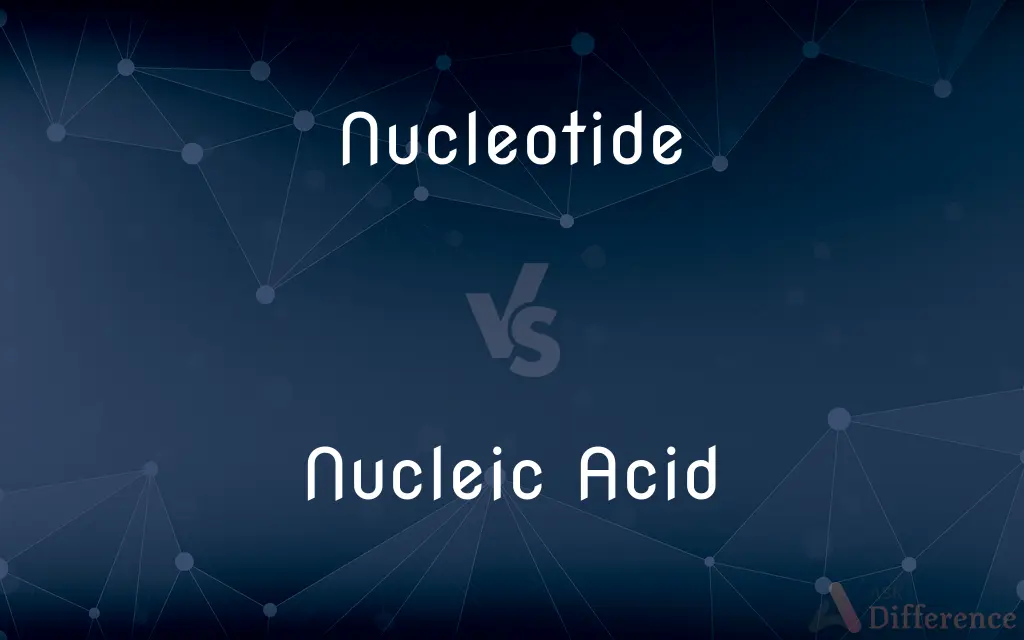Nucleotide vs. Nucleic Acid — What's the Difference?
By Tayyaba Rehman — Published on December 13, 2023
A nucleotide is the basic building block of nucleic acids. Nucleic acids, like DNA and RNA, are long chains of nucleotides. Thus, nucleotides are monomers, while nucleic acids are polymers.

Difference Between Nucleotide and Nucleic Acid
Table of Contents
ADVERTISEMENT
Key Differences
A nucleotide is a compound consisting of a nucleoside linked to a phosphate group. Nucleic acid, on the other hand, is a chain-like molecule made up of a series of nucleotides.
Nucleotides are vital for several cellular processes and form the basic structural unit of nucleic acids such as DNA and RNA. Nucleic acid functions to carry genetic information in cells.
Each nucleotide in nucleic acids is made up of three parts: a sugar, a phosphate, and a nitrogenous base. Nucleic acid, as a chain of these nucleotides, showcases a sequence of bases, which carries the genetic code.
While a nucleotide can exist independently, nucleic acid is a collective term that describes long chains of individual nucleotides. This distinction is critical, as nucleotides serve as the foundation upon which nucleic acids are built.
In conclusion, a nucleotide is an individual unit, whereas nucleic acid is the complex structure formed by the alignment and connection of many nucleotides.
ADVERTISEMENT
Comparison Chart
Basic Definition
Building block of nucleic acids.
Long chains made up of nucleotides.
Components
Sugar, phosphate, nitrogenous base.
Series of nucleotides.
Function
Serves as monomer in the formation of nucleic acids.
Carries genetic information.
Existence
Can exist independently.
Cannot exist without nucleotides.
Examples
Adenosine triphosphate (ATP).
DNA, RNA.
Compare with Definitions
Nucleotide
A molecule composed of a nucleoside and a phosphate.
Adenine is a component of a nucleotide in DNA.
Nucleic Acid
A molecule responsible for storing and transmitting genetic information.
DNA is a type of nucleic acid found in the nucleus of cells.
Nucleotide
An organic molecule that serves as a subunit in nucleic acid structures.
A single nucleotide mutation can lead to genetic disorders.
Nucleic Acid
A polymer formed by nucleotides.
The sequencing of a nucleic acid can determine an organism's genetic makeup.
Nucleotide
The basic structural unit of nucleic acids.
The DNA strand is composed of a sequence of nucleotides.
Nucleic Acid
A biological macromolecule that encodes genetic data.
Scientists study nucleic acid to understand inheritance patterns.
Nucleotide
A compound essential for the synthesis of nucleic acids.
Without nucleotides, the formation of DNA and RNA wouldn't be possible.
Nucleic Acid
A complex molecule formed by chains of nucleotides.
RNA is a nucleic acid essential for protein synthesis.
Nucleotide
The monomer unit for DNA and RNA.
In a strand of DNA, nucleotides pair up to form the double helix structure.
Nucleic Acid
The chemical carrier of an organism's genes.
Damage to nucleic acid can result in genetic mutations.
Nucleotide
Any of a group of compounds consisting of a nucleoside combined with a phosphate group and constituting the units that make up DNA and RNA molecules.
Nucleotide
(biochemistry) The monomer constituting DNA or RNA biopolymer molecules. Each nucleotide consists of a nitrogenous heterocyclic base (or nucleobase), which can be either a double-ringed purine or a single-ringed pyrimidine; a five-carbon pentose sugar (deoxyribose in DNA or ribose in RNA); and a phosphate group.
Nucleotide
A phosphate ester of a nucleoside; one of the monomeric components of DNA or RNA.
Nucleotide
A phosphoric ester of a nucleoside; the basic structural unit of nucleic acids (DNA or RNA)
Common Curiosities
What is a nucleotide?
A nucleotide is the basic building block of nucleic acids, composed of a sugar, phosphate, and nitrogenous base.
Why are nucleic acids important?
Nucleic acids carry the genetic information of an organism, determining its traits and functioning.
Can nucleotides exist outside of nucleic acids?
Yes, nucleotides can exist independently and have functions outside of nucleic acids.
How do nucleotides connect to form nucleic acids?
Nucleotides connect through phosphodiester bonds to form the backbone of nucleic acids.
What role do nucleotides play in nucleic acids?
Nucleotides serve as the monomer units that make up the structure of nucleic acids like DNA and RNA.
What are the two main types of nucleic acids?
The two main types are DNA (deoxyribonucleic acid) and RNA (ribonucleic acid).
Do all organisms have nucleic acids?
Yes, all known living organisms have nucleic acids, which carry their genetic information.
How does a nucleotide differ from nucleic acid?
A nucleotide is an individual unit, while nucleic acid is a chain of these units.
Can changes in nucleotides affect nucleic acid function?
Yes, changes or mutations in nucleotides can alter the function and information carried by nucleic acids.
How many types of nucleotides are there?
There are four main types of nucleotides in DNA: adenine, thymine, cytosine, and guanine. RNA has uracil instead of thymine.
How are nucleotides used in energy transfer?
Certain nucleotides, like ATP, act as energy carriers in cells.
Where are nucleic acids found in the cell?
Nucleic acids like DNA are primarily found in the cell nucleus, while RNA is found throughout the cell.
Can nucleic acids be synthesized in the lab?
Yes, scientists can synthesize nucleic acids in the lab for various research purposes.
What is the significance of the sequence of nucleotides in nucleic acids?
The sequence of nucleotides in nucleic acids encodes the genetic information of an organism.
What role do nucleotides play in genetic engineering?
By manipulating nucleotides, scientists can modify the genetic information in nucleic acids, leading to genetic engineering techniques.
Share Your Discovery

Previous Comparison
Loose Connective Tissue vs. Dense Connective Tissue
Next Comparison
Unicellular Organisms vs. Multicellular OrganismsAuthor Spotlight
Written by
Tayyaba RehmanTayyaba Rehman is a distinguished writer, currently serving as a primary contributor to askdifference.com. As a researcher in semantics and etymology, Tayyaba's passion for the complexity of languages and their distinctions has found a perfect home on the platform. Tayyaba delves into the intricacies of language, distinguishing between commonly confused words and phrases, thereby providing clarity for readers worldwide.
















































